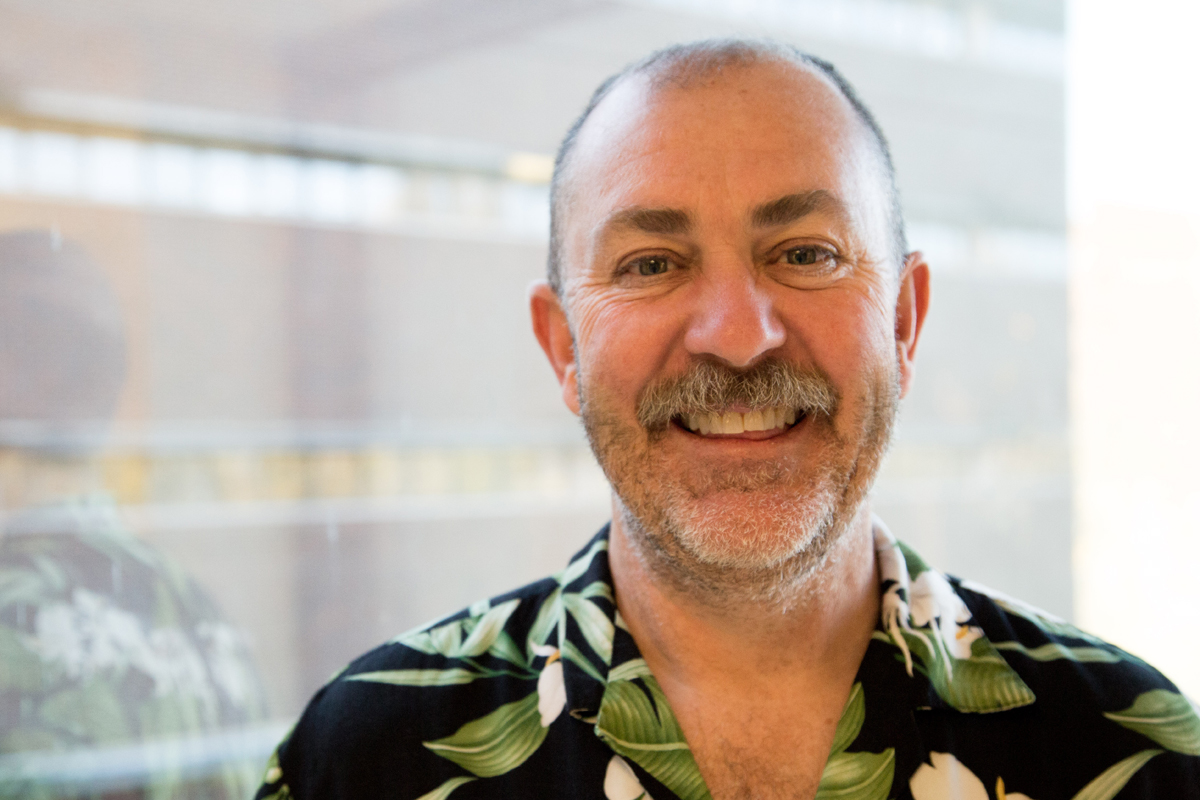Mike Grennan – MEDEX Seattle Class 49
Mike Grennan has served as a Navy Corpsman Reservist for the past 18 years. He has been a paramedic for over 30 years. And he just left station as a Lieutenant/Paramedic with the fire service in April of this year, after serving 27 years in that capacity. Given all of that, you might think that retirement is next for Mike Grennan. But you’d be wrong. Instead, Mike is halfway through his first year as a member of MEDEX’s Seattle Class 49, and on his way to becoming a physician assistant.
“I’m the oldest of the class,” he tells us with a smile. “They have the youngest and the oldest, so I’m one of the bookends. But it’s interesting, because I’ve had a career. I’ve done the EMS, been a paramedic for 30 years. But now, I’m moving on to another phase of my life. And it’s fun.”
In moving on to “another phase,” Mike Grennan is taking his place alongside a long line of former and active military men and women who have looked to the PA profession generally, and to MEDEX Northwest in particular, as a place to rebuild and redirect their military-based medical knowledge and experiences for application in civilian settings. The experiences as a Navy corpsman that Mike Grennan brings with him to MEDEX are extensive, from his medical training with the Marines at Camp Pendleton, to his multiple deployments to Iraq, where he worked with an engineering battalion, a sniper team, a Convoy Security Team’s CB (Construction Battalion) Unit as part of the “troop surge” of 2007, and with a MiTT (Military Transition Team) based in Fallujah.
“We actually took over some homes in Fallujah and did the neighborhood policing, I guess it would be a way to describe it. And we also were co-located with Iraqi troops, so we did daily foot patrols and also set up clinics for citizens in our neighborhood.” Mainly, though, Mike supported the Marines as they moved through the communities in and around Baghdad.
“We took a lot of casualties,” he explains, “so my job was primarily to take care of them and make sure that they were able to remain in the fight. When we would go out on foot patrols, typically we would mix up the elements, so we would be half an Iraqi and half a US element together. So it would be a rifle team of Iraqis, a rifle team of Americans, and we would go out in a platoon strength and do our patrols.”
“But we did quite a bit of taking care of the local population, too. Everybody has some level of training, no matter who you are, whether you’re a marine or navy corpsman. So the citizens would run up with injuries and try to get treated. They knew that they could come to us and get treatment.”
More recently, Mike returned from an 18-month deployment in Afghanistan, where he worked directly with Afghani army and police sergeant majors. “They have a National Defense service over there, which is like a blend of our CIA and FBI. And then they also have a sergeant major for public health. So my job was to mentor them and help them develop their medical systems for each type of medical system.”
“The police hospital system and medical system, it’s very different from what we have here. They only take care of police and dependents of police department employees. Army, same thing, they only take care of army or army dependents. The National Defense Force, same, they only take care of their own. And then, of course, everybody that isn’t covered under those three groups is covered under the national health care system that they have. And so each one of those systems had a sergeant major that was in charge of training, making sure that they got the supplies, training, whatever they needed. And my job was to help that person do his job effectively.”
And now? You could say that Mike Grennan has been deployed yet again, only this time to MEDEX Northwest’s physician assistant training program. We asked Mike about his decision to go with a civilian-based program like MEDEX, rather than the military’s Interservice Physician Assistant Program (IPAP). “It was a easy decision to make,” he replies without hesitation. “In 2003, I met somebody that was going through the MEDEX program, a Spokane student. He was in the master’s program there, and ended up getting deployed. He was supported greatly by MEDEX. And so MEDEX was the only place I was ever going to apply, just because of the way that he was treated.”
And as it turns out, Mike himself went through an experience very much like that of the Spokane student’s, as he was actually admitted to MEDEX a year earlier as a member of Class 48. But the Afghanistan deployment, from which he returned in April 2015, detained him longer than he had hoped or planned for, too long to start with his assigned class.
“So I ended up having to extend, and was rolled over into Class 49. And the way I’ve been treated … well, Mariah (Kindle, Interim Director of Admissions) has been great. She said ‘Okay, you’re not coming to Class 48, but you’re the first in Class 49.’ She gave me updates, kept me apprised, connected me with Class 49 students. ‘Don’t worry about it,’ she said. ‘You’re coming back.’ Super, super supportive. There are people that put a yellow ribbon on their car, or put a yellow ribbon on their lapel. But then there are people who demonstrate by their actions, I guess, by their support, and MEDEX did that.”
Mike pauses, then adds, “And I tell you, the GI bill? Huge. I couldn’t have done this without the GI bill. It’s amazing. And it actually works.”
Has he thought about where his medical career might take him after completing his years with MEDEX?
“Probably family practice. I’m looking at developing more of a long-term relationship with patients. My whole life has been ‘treat ‘em and street ’em,’ as we say, pick them up, take care of them, drop them off, and then leave and don’t look back. I’m looking forward to actually taking care of patients and seeing how they turn out 15 years 20 years later. It’ll be fun.”


